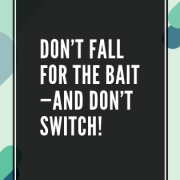Land the Plane
Interviews
When I coach someone on interviewing, I focus on what they’re saying (content) as well as how they’re saying it (delivery). We review specifics – everything from specific examples they’re using during the interview to their choice of words.
Little things count during an interview. And one of the main issues clients want to work on is being more concise. They may even say “I’ve been told I go on too long. I need to be more direct.” This is actually awesome feedback. We can work with this. All it takes is a bit of practice and getting more comfortable with not talking. That doesn’t mean that you shouldn’t give more than a one or two sentence answer, what it means is that you need to get in the habit of cutting yourself off.
But don’t just take my word on this. I recently asked a recruiter, who does a TON of interviewing, what mistake she sees most often during interviewing. Her response was immediate. “Just land the plane.” Brilliant, no? She bottom-lined the essence of all interview answers. Get to the point sooner, rather than later.
Let me give you an example. If the interview question is “Tell us about a time when you had to step in on a project that wasn’t going well.” Here’s the formula I suggest for answering: Describe the situation in high level detail. What sort of project (especially if relevant to the job), the players, any extenuating circumstances (over budget, important client, tight deadline).
You’ll lose the interviewer with too much detail, and you’ll bore them if you don’t provide enough. Be discerning in the details – always put yourself in the position of the interviewer and ask yourself “Why am I telling him/her this detail? What’s the point?”
Then describe what action or approach you took. Again, don’t go into excruciating detail. Describe your communications strategy or how your technical expertise fit, for example. “The first thing I did wasn’t all that innovative, but it was straightforward and practical. I simply went around, and informally talked one-on-one to everyone involved in the project to find out, from their perspective, what needed to be done. Not only did this help me get up-to-speed quickly, but I learned a lot about the dynamics of the team with this informal approach. After I gathered the core pieces I needed, I scoped out a rough project timeline. Then, I called a formal meeting – with a very clear agenda — we had 45 minutes to walk away with a 10 day action plan.”
Interviewers don’t want story-tellers –they want candidates who will answer questions directly and provide relevant examples to illustrate a skill or competency.
Then you can reveal the result. And the result doesn’t always have to be a success, of course. Talk about what you learned or what you would do differently. “We ended up meeting for 2 hours and the conversation was heated at times. We came up with not only the action plan, but we formed mini-groups to tackle some of the trickier issues that had stalled the project. In the end, we documented our recommendations for our client services team that included some important technical specifications for clients, and a revised implementation timeline that was more realistic. That master timeline is still being used today and Client Services now consults with our team before making any client commitments. “
Notice that there’s just enough detail so I can imagine the situation, without you having to describe it fully. Remember, these are just general guidelines, and if you’re interviewing for more technical positions, then, by all means, you’ll need to provide more technical detail. Interviewers don’t want story-tellers –they want candidates who will answer questions directly and provide relevant examples to illustrate a skill or competency.
Here’s one final observation: When answering a difficult question such as “Why did you leave your last job?” or “Why are you leaving your job?” it’s just human nature to want to explain ourselves. So we provide way more detail than we need to. If you have any type of emotional reaction to a potential interview question, make sure you’re not trying to make yourself understood by providing too much detail. Don’t fall into this dangerous trap – otherwise you’ll find yourself circling Chicago O’Hare, JFK or Dallas/Fort Worth. Just land the plane.



